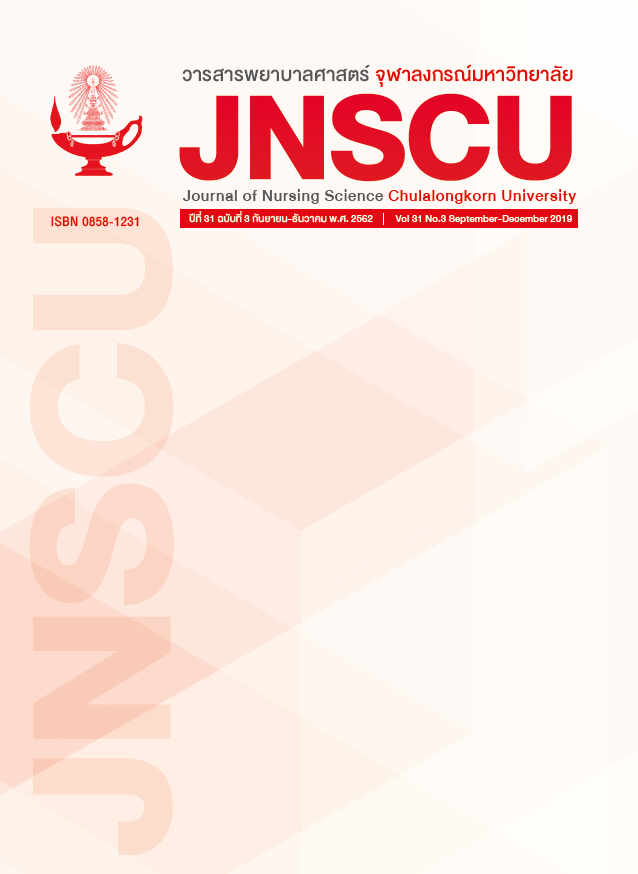ผลของโปรแกรมการส่งเสริมความสามารถในการดูแลตนเองต่อพฤติกรรมการดูแลตนเองภายหลังการผ่าตัดเพื่อลดน้ำหนักของผู้ป่วยโรคอ้วน
คำสำคัญ:
ผู้ป่วยโรคอ้วน, การผ่าตัดเพื่อลดน้ำหนัก, โปรแกรมการส่งเสริมความสามารถในการดูแลตนเอง, พฤติกรรมการดูแลตนเองบทคัดย่อ
วัตถุประสงค์: 1) เพื่อศึกษาผลของโปรแกรมการส่งเสริมความสามารถในการดูแลตนเองต่อพฤติกรรมการดูแลตนเองภายหลังการผ่าตัดเพื่อลดน้ำหนักของผู้ป่วยโรคอ้วน 2) เพื่อเปรียบเทียบพฤติกรรมการดูแลตนเองภายหลังการผ่าตัดเพื่อลดน้ำหนักของผู้ป่วยโรคอ้วนระหว่างกลุ่มที่ได้รับโปรแกรมการส่งเสริมความสามารถในการดูแลตนเองกับกลุ่มที่ได้รับการพยาบาลตามปกติ
แบบแผนงานวิจัย: การวิจัยแบบกึ่งทดลอง
วิธีดำเนินการวิจัย: กลุ่มตัวอย่าง คือ ผู้ป่วยโรคอ้วนทั้งเพศชายและหญิง อายุ 18 – 59 ปี ที่ได้รับการผ่าตัดเพื่อลดน้ำหนักที่โรงพยาบาลจุฬาลงกรณ์ จำนวน 30 คน แบ่งเป็นกลุ่มทดลองและกลุ่มควบคุม กลุ่มละ 15 คน จับคู่ด้วยเพศ อายุ และชนิดการผ่าตัด กลุ่มควบคุมได้รับการพยาบาลตามปกติ และกลุ่มทดลองได้รับโปรแกรมการส่งเสริมความสามารถในการดูแลตนเอง ที่ผู้วิจัยสร้างขึ้นตามกรอบแนวคิดทฤษฎีการดูแลตนเองของ Orem ประกอบด้วย 3 ขั้นตอน คือ การคาดการณ์ การปรับเปลี่ยนพฤติกรรม และการลงมือปฏิบัติ เก็บรวบรวมข้อมูลเป็นระยะเวลา 8 สัปดาห์ ด้วยแบบวัดพฤติกรรมการดูแลตนเองภายหลังการผ่าตัดเพื่อลดน้ำหนัก และมีค่าสัมประสิทธิ์แอลฟ่าครอนบาค เท่ากับ .81 วิเคราะห์ข้อมูลด้วยสถิติเชิงพรรณนาและสถิติทดสอบที
ผลการวิจัย: 1) ผู้ป่วยโรคอ้วนภายหลังได้รับการผ่าตัดเพื่อลดน้ำหนักที่ได้รับโปรแกรมการส่งเสริมความสามารถในการดูแลตนเอง มีคะแนนเฉลี่ยพฤติกรรมการดูแลตนเองเท่ากับ 4.13 (SD = 0.25) อยู่ในระดับดี
2) ผู้ป่วยโรคอ้วนภายหลังได้รับการผ่าตัดเพื่อลดน้ำหนัก กลุ่มที่ได้รับโปรแกรมการส่งเสริมความสามารถในการดูแลตนเอง มีคะแนนพฤติกรรมการดูแลตนเอง (Mean = 4.13, SD = 0.25) มากกว่ากลุ่มที่ได้รับการพยาบาลตามปกติ (Mean = 3.68, SD = 0.31) อย่างมีนัยสำคัญที่ระดับ .05
สรุป: โปรแกรมการส่งเสริมความสามารถในการดูแลตนเองนี้ ควรนำไปประยุกต์ใช้เพื่อส่งเสริมพฤติกรรมการดูแลตนเองภายหลังการผ่าตัดเพื่อลดน้ำหนัก
คำสำคัญ: ผู้ป่วยโรคอ้วน / การผ่าตัดเพื่อลดน้ำหนัก / โปรแกรมการส่งเสริมความสามารถในการดูแลตนเอง / พฤติกรรมการดูแลตนเอง
เอกสารอ้างอิง
1. Nightingale CE, Margarson MP, Shearer E, Redman JW, Lucas DN, Cousins JM, et al. Guidelines Peri-operative management of the obese surgical patient 2015. Anesthesia. 2015;70:859-76.
2. Weingarten TN, Flores AS, McKenzie JA, Nguyen LT, Robinson WB, Kinney TM, et al. Obstructive sleep apnoea and perioperative complications in bariatric patients. BJA: The British Journal of Anaesthesia. 2011;106(1):131-9.
3. Sutdhachit Leenananda. Preoperative Management and Patient Selection. In: Teerapol Aungkulpakdeekul, Preeda Sumritpradit, Paisal Pongchaiyaruk, editors. Salayasardwiwat 44 (Surgery for Metabolic and Morbid Obesity). Bangkok: Bangkok Vejchasarn. 2011. [In Thai].
4. Doolen JL, Miller SK. Primary care management of patients following bariatric surgery. Journal of the American Academy of Nurse Practitioners. 2005;17(11):446-50 5p.
5. Zhang L, Tan WH, Chang R, Eagon JC. Perioperative risk and complications of revisional bariatric surgery compared to primary Roux-en-Y gastric bypass. Surgical Endoscopy. 2015;29(6):1316-20.
6. Puchong Timrat. Bariatric and Metabolic Surgery: An Overview. In Teerapong Aungkulpakdeekul, Preeda Sumritpradit and Pisal Pongchairuk, editors. Salayasardwiwat 44 (Surgery for Metabolic and Morbid Obesity). Bangkok: Bangkok Vejchasarn. 2011. [In Thai].
7. Medical Records of King Chulalongkorn Memorial Hospital. Data of Bariatric Surgery at Sirindhorn Operating Theatre King Chulalongkorn Memorial Hospital. King Chulalongkorn Memorial Hospital; 2016 1 Jan 2016 - 31 Aug 2016. [In Thai].
8. Suriya Phanchai. Bariatric Surgery. Srinagarind Med J. 2013;28:116-26. [In Thai].
9. Maggard MA, Shugarman LR, Suttorp M, Maglione M, Sugarman HJ, Livingston EH, et al. Meta-analysis: Surgical treatment of obesity. New England Journal of Medicine. 2005;142(7):547-59.
10. Mechanick JI, Kushner RF, Sugerman HJ, Gonzalez-Campoy JM, Collazo-Clavell ML, Spitz AF, et al. American Association of Clinical Endocrinologists, The Obesity Society, and American Society for Metabolic & Bariatric Surgery medical guidelines for clinical practice for the perioperative nutritional, metabolic, and nonsurgical support of the bariatric surgery patient. Obesity (19307381). 2009;17:S1-v.
11. Herzog SA. Bariatric patients' knowledge of postoperative complications and lifestyle change. Bozeman, Montana: Montana State University; 2010.
12. Aguilera M. Post-surgery support and the long-term success of bariatric surgery. Practice Nursing. 2014;25(9):455-9 5p.
13. Orem DE. Nursing: Concepts of Practice. 6 th ed. St. Louis: Mosby; 2001.
14. Suwannee Chobkarnrai, Wallada Chanruangvahich, Orapan Tosingha etc. Factors in Prediction of Self-Care Behavior among Post-Lumbar Surgery Degenerative Spine Patients. The Journal of Nursing Council. 2013;28(3):68 - 79. [In Thai].
15. Tippawan Yamsribua. Factor Affecting Self-care Behaviors of Coronary Artery Disease Patients Receiveing Coronary Artery Bypass Graft at Phramongkutklao Hospital. Bangkok: Kasetsard University; 2009. [In Thai].
16. Paranee Thapsongsang. Predictors of Self-care Deficit in Patients Undergone Coronary Artery Bypass Grafting. Changmai: Changmai University; 1998. [In Thai].
17. Rudolph A, Hilbert A. Post-operative behavioural management in bariatric surgery: a systematic review and meta-analysis of randomized controlled trials. Obesity reviews. 2013;14:292 - 302.
18. Evers G, et al. Appraisal of self-care agency scale. Netherland: Van Gorcum Assent Mastricht; 1989.
เผยแพร่แล้ว
ฉบับ
ประเภทบทความ
สัญญาอนุญาต
ลิขสิทธิ์ (c) 2020 วารสารพยาบาลศาสตร์ จุฬาลงกรณ์มหาวิทยาลัย

อนุญาตภายใต้เงื่อนไข Creative Commons Attribution-NonCommercial-NoDerivatives 4.0 International License.
##default.contextSettings.thaijo.licenseTerms##


